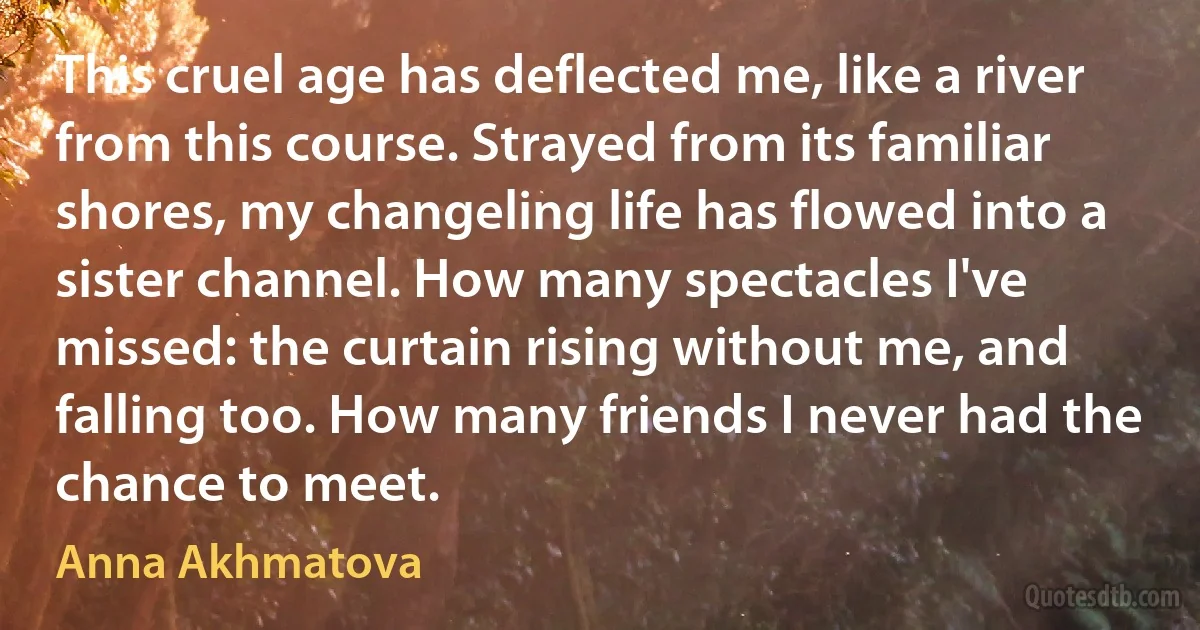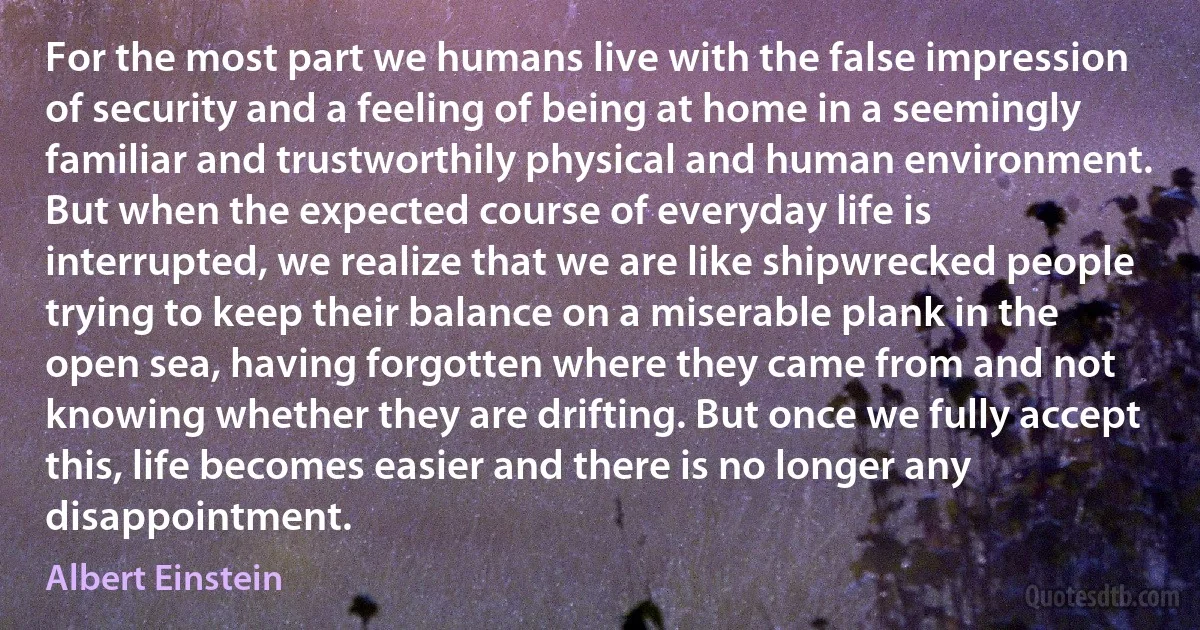Familiar Quotes - page 35
I would like to take your minds back many, many centuries into a familiar experience so significantly recorded in the sacred Scriptures. The Children of Israel had been reduced into the bondage of physical slavery... three groups of people emerged. One group said in substance that "We would rather go back to Egypt." They preferred the flush parts of Egypt to the challenges of the Promised Land. A second group that abhorred the idea of going back to Egypt, and yet they abhorred the idea of facing the difficulties of moving ahead to the Promised Land and they somehow wanted to remain stationary and choose the line of least resistance. There was a third group, probably influenced by Caleb and Joshua who had gone over to spy a bit and who admitted that there were giants in the land but who said, "We can possess the land."

Martin Luther King Jr.
They meant to set up a standard maxim for free society which should be familiar to all, constantly looked to, constantly labored for, and even, though never perfectly attained, constantly approximated, and thereby constantly spreading and deepening its influence, and augmenting the happiness and value of life to all people, of all colors, everywhere.

Abraham Lincoln
Accounts of outrages committed by mobs form the every-day news of the times. They have pervaded the country from New England to Louisiana, they are neither peculiar to the eternal snows of the former nor the burning suns of the latter; they are not the creature of climate, neither are they confined to the slaveholding or the non-slaveholding States. Alike they spring up among the pleasure-hunting masters of Southern slaves, and the order-loving citizens of the land of steady habits. Whatever then their cause may be, it is common to the whole country. [...] Such are the effects of mob law, and such are the scenes becoming more and more frequent in this land so lately famed for love of law and order, and the stories of which have even now grown too familiar to attract anything more than an idle remark. But you are perhaps ready to ask, "What has this to do with the perpetuation of our political institutions?" I answer, "It has much to do with it."

Abraham Lincoln
Into that world comes a young William Wilberforce - a young Parliamentarian - who saw this and said this is evil, this is wrong, I will do what I can to fight it. In some ways, it's very similar to our situation here with regard to abortion because that's a multi-million dollar industry. You know the money that even our own Congress gives to Planned Parenthood is reminiscent of the evil that was expressed in that day because other Parliament members didn't want to touch that very lucrative business. And so here you've got Wilberforce standing up and saying "this is wrong" and he was vilified and attacked and discredited and marginalized. It sounds kind of familiar to what happens to pro-life people today.

James Dobson
During the past few weeks, I have talked by telephone on numerous occasions with a fine, Christian lady whose face and voice are familiar to most Americans. Her name is Anita Bryant. She has stood beside Billy Graham during his televised crusades. No doubt you have seen her also as she appeared on television commercials advertising Florida orange juice.
She is a lovely person, deeply committed to Christianity. She is also a concerned American- concerned about the erosion of moral principles and indecency in all of the forms spreading out across America. She has warned that unless America returns to basic principles, our freedoms are in jeopardy. Not so long ago, she spoke out against America's growing tendency to give respectability to homosexuality. And that's where her troubles began.

Jesse Helms
There is nothing more to this than a simple iterative formula. It is so simple that most children can program their home computers to produce the Mandelbrot set. ... Its astounding complication was completely out of proportion with what I was expecting. Here is the curious thing: the first night I saw the set, it was just wild. The second night, I became used to it. After a few nights, I became familiar with it. It was as if somehow I had seen it before. Of course I hadn't. No one had seen it. No one had described it. The fact that a certain aspect of its mathematical nature remains mysterious, despite hundreds of brilliant people working on it, is the icing on the cake to me.

Benoît Mandelbrot
The notion of time familiar to us may... be reconstructed in special physical situations, or within an approximation, as... the "surface of a liquid" disappears ...[at] the atomic level, or "temperature" ...makes sense only in certain physical situations and when there are enough degrees of freedom.

Carlo Rovelli
The Swiss-born psychiatrist Elisabeth Kubler-Ross changed western cultural resistance to dealing with death, and the teaching of how to accept it... Kubler-Ross's best known contribution to the study, thanatology, that she had helped to create, was the five stages of dying people go through. She described them - denial, anger, bargaining, depression and acceptance - in her bestseller On Death And Dying (1969), written in two months. Not everyone experiences all five, she cautioned, but at least two are always present. The definition, reached after scores of interviews with people facing imminent death, helped the medical profession to deal with a factor it had long refused to acknowledge, especially in the US... She wrote more than 20 books.. A firm believer in a god and the life hereafter, she became fascinated with near-death experiences and an advocate for people's stories of seeing a shining light and familiar faces, before being brought back from the brink.

Elisabeth Kübler-Ross
Well, if I were thus rationed in this article and could have but one adjective for George Gershwin, that adjective would be "ingenuous." Ingenuous at and about his piano. Once an occasional composer named Oscar Levant stood beside that piano while those sure, sinewy, catlike Gershwin fingers beat their brilliant drum-fire-the tumultuous cascade of the "Rhapsody In Blue," the amorous languor of "The Man I Love," the impish glee of "Fascinating Rhythm," the fine, jaunty, dust-spurning scorn of "Strike Up the Band." If the performer was familiar with the work of any other composer, he gave no evidence of it. Levant (who, by the way, makes a fleeting appearance in the new Dashlell Hammett book, under the guise of Levi Oscant) could be heard mutterIng under his breath, "An evening with Gershwin Is a Gershwln evening." "I wonder," said our young composer dreamily, "if my music will be played a hundred years from now." "It certainly will be," said the bitter Levant,"if you are still around."

George Gershwin
There were many natural philosophers, particularly in the West, who looked to al-Kindi for support in their defense of a combined intromission-extramission theory. Grosseteste, an early defender of such a combined theory, was in all likelihood familiar with al-Kindi's De aspectibus and probably had al-Kindi in mind when he wrote: "However, mathematicians and physicists, whose concerns is with those things that are above nature, ...maintain that vision is produced by extramission." Later in the thirteenth century Roger Bacon and John Pecham also appealed to the authority of al-Kindi to support their contention that rays issue from, as well as enter, the observer's eye.

John Peckham
Whenever I'm faced with a difficult choice, my approach has always been to make an estimate of the situation- a familiar military process. What's the situation? What's the mission? What are the different courses of action? Which looks most likely to succeed? Now, follow your informed instinct, decide, and execute forcefully; throw the mass of your forces and energy behind the choice. Then take a deep breath and hope it works, remembering that "hope is a bad supper, but makes a good breakfast."

Colin Powell
Carnap made a detailed analysis of Heidegger's statement, "Nothing nihilates,” in order to show that it is purely verbal, devoid of empirical meaning. (Incidentally, this is the only sentence from existentialist philosophy the majority of contemporary positivists appear familiar with.)

Leszek Kołakowski
The dreaming body is as real as anything we deal with in the world. The second attention is unavoidably drawn to focus on our total being as a field of energy, and transforms that energy into anything suitable. The easiest thing is, of course, the image of the physical body, with which we are already thoroughly familiar from our daily lives and the use of our first attention.

Carlos Castaneda
Jiang: You all... My feeling is that you the media need to learn more. You are very familiar with the Western set of values, but after all you are too young. Do you understand what I mean? Let me tell you, I've been through hundreds of battles. I've seen a lot. Which country in the West have I not been to? Every time... You should know Mike Wallace in the US. He's way above you all! He and I talked cheerfully and humorously, which is why the media need to raise your intellectual level. Got it or not?

Jiang Zemin



